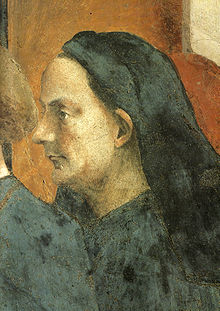Brunelleschi’s Cruellest Practical Joke May 18, 2013
Author: Beach Combing | in : Medieval, Modern , trackbackBeach has recently been wondering about the potential for putting together a collection of practical jokes from history. A particular favourite is the joke played by the brilliant Florentine architect, Filippo Brunelleschi (picture) and a gang of rowdies, c. 1409. It comes down to us in various versions collectively known as the Novella del Grasso Legnaiuolo (the Story of the Fat Cabinet Maker), which begin to emerge in the 1480s. In other words the joke or (in Florentine) beffa is well within living memory and, as we will see, some of the details tally with information we can find elsewhere in contemporary records. Beachcombing’s money is on this actually having happened. The version here is a modern retelling from Ross King’s Brunelleschi’s Dome. It is employed partly because it is in English and partly because RK tells it well.
The hoax took place in Florence about 1409, during one of Filippo’s returns from Rome. The victim was a carpenter named Manetto, known as il Grasso, or the ‘Fat Man’. Manetto specialized in carving ebony and owned a shop in the Piazza San Giovanni, not far from Filippo’s house. He was prosperous and good-natured, but one day had the misfortune of incurring Filippo’s ire after missing a social gathering. Never one to resist retaliation, Filippo resolved to exact his revenge for this perceived slight by persuading a wide cast of characters to convince Manetto that he had metamorphosed into someone else: a well-known Florentine named Matteo.
Beach interjects here that Manetto certainly existed, we have documentation. There is nothing a priori impossible about this story.
As Maneto closed his shop one evening, Filippo went to [Manetto’s] house near the cathedral, picked the lock, slipped inside and barred the door behind him. When Manetto arrived a few minutes later, he rattled the door and then, to his alarm, heard what sounded like his own voice (in fact Filippo doing an impersonation) ordering him to go away. This impersonation was so convincing that he retreated in bewilderment into the Piazza San Giovanni. There he met Donatello, who inexplicably addressed him as Matteo, and shortly afterwards a bailiff, who likewise hailed him as Matteo and then promptly arrested him for debt. He was taking to the Stinche prison, where his name was entered in the gaol book as Matteo. Even his fellow prisoners – all of the party to Filippo’s prank – addressed him by this alien name.
Humour is often said to be the most transient thing. What was funny for our ancestors can seem to us stone-cold unfunny: Shakespeare’s tragedies translate into modern times far better than, say, As You Like It. Beach’s main reaction here is to think of Maneto’s mental health: and all this because the poor man missed a dinner party! Renaissance comedy was invariably cruel.
The carpenter spent a sleepless night, fretting over events but solacing himself with the thought that he was merely a victim of mistaken identity. This comfort evaporated the next morning when two strangers – the brothers of the real Matteo arrived at the prison and claimed him as their kin. They paid his debt and liberated him, though not before chastising him for his supposed gambling and profligate living. More bewildered now than ever, he was escorted to Matteo’s home on the other side of Florence, near Santa Felicità, where his protests that he was not Matteo, but Manetto, appeared to fall on death ears. Over the course of an evening he almost became convinced that he had indeed metamorphosed into someone else. He was then put to sleep with a potion supplied by Filippo and carried, unconscious back across the river to his own home. He was laid on his bed in a reversed position, with his head at the foot and his feet at the head.
The finale shows Filippo’s genius.
Awakening many hours later, the poor carpenter was confused not merely by his position on the bed but also by the disarray of his house, for his tools had been completely rarranged. His perplexity grew with the arrival of Matteo’s brothers. These two men now treated him differently, greeting him as Manetto and relating the curious story of how the previous evening their brother Matteo conceived the fantastic notion that he was someone else. The story was soon confirmed by Matteo himself – the real one who arrived at Manetto’s house to describe his puzzling dream of having been a carpenter. The disarray of the house was explained by the fact that in his dream Matteo noticed how his tools were out of order and needed rearrangement. Faced with this evidence Manetto became more convinced than ever that, for a while at least, he had exchanged identities with Matteo – in the same way that their names, so close in spelling, could be shuffled together and confused.
Manetto fled to Hungary when the joke told abroad and there we have records at Ozora that Manetto was in residence and the local castle shows signs of Florentine workmanship. Any other practical jokes from the annals? drbeachcombing at yahoo dot com



